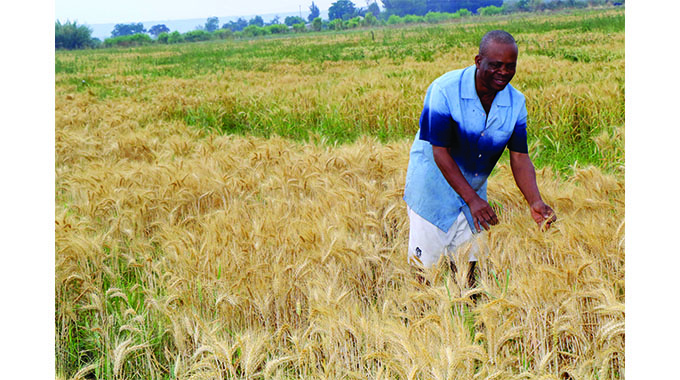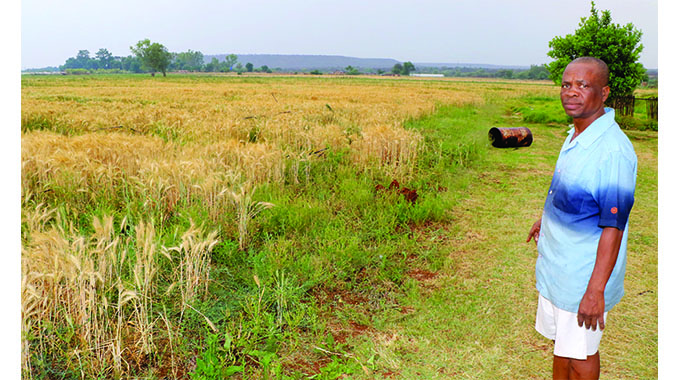The Chronicle

Chronicle Reporters
Despite the heavy weight of illegal sanctions imposed by the United States, United Kingdom and their allies at the turn of the millennium, Zimbabweans have been up to the challenge and are now reaping rewards for riding out economic hardships.
The country’s land reform programme implemented in 2000 triggered the imposition of economic sanctions against Zimbabwe, mainly taking the form of the Zimbabwe Democracy and Economic Recovery Act (Zidera) of America. However, these illegal sanctions have not broken the spirit of Zimbabweans many of whom have become their own employers and are contributing to the national economy.
In the agriculture sector, for example, resettled farmers continue to record a success story as they contribute significantly to food security in line with the Agriculture and Food System Transformation Strategy (2020-2025).
The strategy, which was launched by President Mnangagwa in August last year, pushes for Zimbabwe to grow its own food and ensure the majority of rural families move from poverty to affluence.
The Second Republic has made food security a top priority and agriculture sector has already hit the initial 2025 target of US$8,2 billion a year as the industry grew by 36,2 percent to US$8,19 billion in 2021, underpinned by the country’s National Development Strategy 1 (NDS1) — the driver towards Vision 2030 of making Zimbabwe an upper middle-income economy.
In the Matabeleland region, several black farmers who benefited from the land reform programme have proved that despite the sanctions, Zimbabwe can still produce.
One such successful farmer, who got land at the age of 35 in 2002, is Mr Dumisani Ncube of Umguza, who abandoned his job as an electrician to be part of the new revolution that Zimbabwe had embarked on.
Mr Ncube who was allocated land in Umguza, Matabeleland North, is part of wheat farmers who will help the country achieve national wheat surplus, as he planted 3,5 hectares of crop.
While gazing over his promising wheat crop which is almost ready for harvesting, he argues that empowering blacks with land was a masterstroke on the part of Government.
Mr Ncube told a Chronicle news crew yesterday that choosing farming over a fulltime job was one of the best decisions he had made in his life.
“I benefited from the land reform programme. I am an electrician by profession, but I abandoned that when I was allocated land. There was nothing so when I was allocated the land, I started investing in it,” said Mr Ncube.
“I got my pump and the irrigation department assisted with pipes when I started farming. I also got a loan from Agribank to kick start my project.”
He said while transitioning from being an electrician he had little knowledge on farming, but dedication and attending seminars assisted in becoming productive on the land.

Mr Ncube said he is not surprised that when Government embarked on the land reform programme, there was resistance from America and Western allies.
He said the former colonialists understood the value in the land, hence they did not want to lose it.
“No wonder why there is the problem with whites over land. There is money on the land, if you work it, if you utilise it 100 percent. For instance, if I put my US$100, I’m guaranteed of getting US$1000. So, there is a lot of money in farming, it is the backbone of the economy,” he said.
Mr Ncube said he has been able to send his children to school up to university level through farming.
He said proceeds from farming have enabled him to buy two houses in Bulawayo and expand on business ventures.
“I have achieved a lot. I have built two houses from the money that I got from farming. I bought a seven-tonne truck and I have a mine in Inyathi all through this land,” he said.
While Mr Ncube is a direct beneficiary of the land reform programme, Mr Elias Tavengwa, his neighbour, indirectly benefited from the empowerment programme, as he managed to get a job at a farm.
Mr Tavengwa (40) does not believe he is just a farm labourer, but a farmer, largely due to good relations with his employer who has apportioned him a piece of land.
“I don’t own this land, but through performing well last year in the potato crop that we had, I was rewarded. My employer decided to allocate a piece of land to me as well, for me to complement my salary. So, this year, I have also planted my potatoes from the piece of land that has been allocated to me and by December I expect to produce 35 to 40 pockets of potatoes,” said Mr Tavengwa.

Mr Tavengwa also has onions that are almost ripe and he believes if land is properly utilised it can transform lives.
In Umzingwane District, Mr Obert Chinhamo is one of the top stud breeders in Matabeleland South Province.
He has 320 animals on 80 hectares of land. These include 180 pedigree Simmentals, 10 pedigree Simbrahs and 130 commercial Simbrahs and Simmentals.
Mr Chinhamo said while illegal sanctions had far-reaching effects on the country, they had provided an opportunity to livestock farmers to create their own wealth.
“The sanctions are a bad thing for the country, but from a breeder’s point of view, they have given us an opportunity to rebuild our country. As the black people we are now rebuilding our country from whatever resources we have and once again we will be recognised across the world for our beef. One day there will be a story to tell that the same sanctions which the Western countries imposed on us to cripple our operations actually motivated us to grow the livestock industry,” he said.
“This period presents a real opportunity for the real Zimbabwean farmer to grow the sector. Yes, we used to export beef to Europe and now we can’t because of the sanctions, but we can also utilise regional markets. In the midst of sanctions, I have come up with solutions to enhance my production such as silage production, pen fattening, mechanised fodder production, oats production and grass baling.”
Gwanda-based farmer Mr Thabani Sibanda who has about 400 cattle said he has managed to successfully grow his herd during the illegal sanctions period.
His herd comprises of Brahmans, Beef Masters and cross breeds. He is also practicing stud breeding.
When he started his livestock farming project, Mr Sibanda only had traditional breeds. He later realised the importance of quality of breeds and then introduced Brahman bulls to cross breed.
Mr Sibanda fully ventured in livestock farming in 2014 when the country was already under illegal sanctions. He said he made a resolution that he would become a successful livestock farmer without having to rely on foreign intervention.

Mr Sibanda said the growth of the livestock sector, especially in Matabeleland Region, is an indication that indigenous people are highly productive.
“The illegal sanctions might have affected issues such as credit lines which can help farmers to access loans, but the truth is that as a region, we are endowed with natural resources that can anchor our production processes. We also have markets locally which have sustained our operations such as abattoirs and other beef processing companies. Government has also created platforms for us to access markets such as public auctions. The illegal sanctions might have been imposed to punish us but I think the livestock sector is proof enough that we are an able nation,” he said.
Mr Sibanda said programmes which had been implemented by Government to grow the livestock sector such as the Presidential Livestock Scheme and Presidential Tick Grease Programme had gone a long way to cushion farmers.
Mr Sibanda who benefited from the Land Reform Programme said he fully understands his role in developing the country which is being treated unfairly for empowering its people, himself included.
In Nkayi, there is a family growing over 300 citrus fruit trees after they invested in extraction of underground water.
Mr Daniel Dlamini from Mathetshaneni, said while some view Nkayi District as an unsuitable area for serious farming ventures, his family has proved that investment in water can change all of that.
He said they are also produce paw paws and grapes.
“We have always been vegetable farmers. We usually grow tomatoes and cabbages. When we managed to set up the irrigation early this year, we decided to try citrus trees,” Mr Dlamini said.
Mr Lovemore Machipisa is a Victoria Falls-based indigenous tour operator who has defied economic hardships caused by the illegal sanctions as his company has grown from a small business to a competitive entity.
Mr Machipisa and his wife Leana founded Africa Travel Tours in 2006, right at the height of the illegal sanctions that were imposed on the country at the turn of the millennium and has not been deterred.
Africa Travel and Tours now boasts of own premises, workshop and a fleet of 15 luxury vehicles and buses used for transporting tourists in an industry dominated by whites.

About 18 workers are permanently employed at the company, contributing significantly to employment in the resort city.
Mr Machipisa said through the grace of God, his business has survived the test of time.
“We have survived by generally by being principled and remaining guided by the core business of offering personalized service that we would have advertised. That we have come this far with my wife in this business is through the Grace of God.
“Sometimes we terminated contracts of contract workers and put some on shifts as things were bad, but we have remained afloat and have expanded,” said Mr Machipisa.
He is one of the many indigenous tour operators that despite the illegal sanctions have had a breakthrough in the white-dominated industry.
Article Source: The Chronicle
